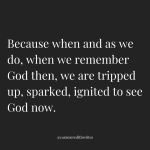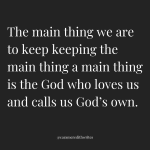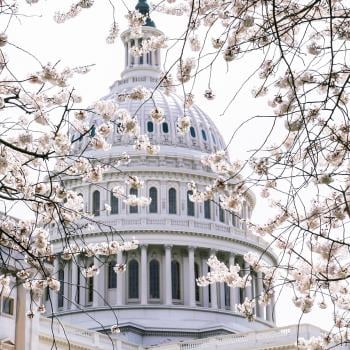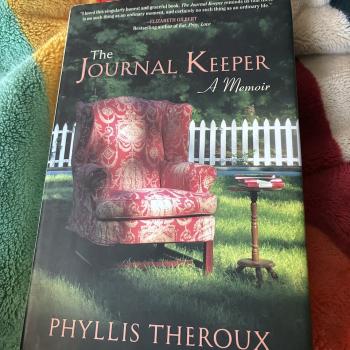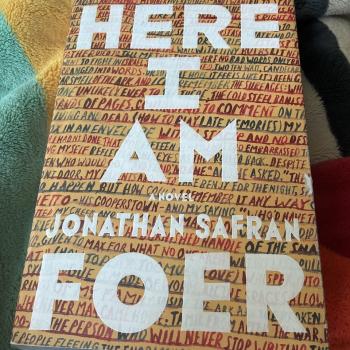Today’s post is going to require a little bit of jazzy singing on your part …courtesy of Schoolhouse Rock. Don’t believe me? Just keep reading. As per the usual, head over to the church’s Facebook page to catch the video!

When I was a high school English teacher, I made a big deal of conjunctions. Conjunctions, of course, are those words that serve to connect, “hooking up words and phrases and clauses,” as can be found in the rather snazzy tune, “Conjunction Junction.” (Conjunction junction, what’s your function? Hooking up words and phrases and clauses). You can have yourself a rollicking good time by looking it up on YouTube when you get home today and singing along to its jazzy syncopation.
But before you start throwing tomatoes at me for digging up dreaded memories of Parts of Speech, let me just say this: a conjunction is a word like and. But. Or. The list of conjunctions continues, but I sing these words over you because I can’t help but notice that in this week’s lectionary readings, the conjunction game is strong.
When I sat down with Isaiah’s passage this last week, I first found myself underlining the verbs. Yes, the verbs. I know, we’re back to Parts of Speech, but when words like “created” and “formed,” “redeemed” and “called,” jump off the page in the first verse alone – words that solely have to do with the Lord’s thoughts of US – well, you know there’s something there.
“GAH! Verbs!” I wrote beside the text, which is, indeed, the truth of my ultra-fine point purple Sharpie.
“When you pass through the waters, I will be with you,” God reminds the people through the prophet Isaiah. “And through the rivers, they shall not overwhelm you; when you walk through fire, you shall not be burned, and the flame shall not consume you.”
Certainly, the power of God cannot be denied. The love of God cannot be ignored. The with-ness of God, when we are in sticky, trying, water-up-to-our-necks situations cannot be erased …and how true that feels in a time of overwhelm like many of us are feeling right now.
Covid, not that it ever went away, is back, with a vengeance, it seems. Death has touched our community, both intimately and from afar. Memories of last year’s insurrection threaten to erase the significance of the day that marks the start of Epiphany, and wildfires ravage our neighbors in Colorado.
Lest the reminders of the present God-With-Us, even in the midst of hardship, hope doesn’t exactly seem on the horizon.
But this, of course, begs us continue with our reading, which for me, brought me to a verse that stopped me in my tracks.
“For I am the Lord your God,” the text continued. “The Holy One of Israel, your Savior. I give Egypt as your random, Ethiopia and Seba in exchange for you.” (And here it is, here it is). “Because you are precious in my sight, AND honored, AND I love you, I give people in return for you, nations in exchange for your life.”
The text could have read more pointedly. God could have stated this trifecta of declarations with a period after each line, or perhaps a semi-colon in between.
You are precious in my sight. Period. You are honored. Period. I love you. Period. So, I give people in return for you, nations in exchange for your life. Period, end paragraph.
But nope, the conjunction “and” was chosen instead: You are precious in my sight AND you are honored AND I love you, (so), I give people in return for you, nations in exchange for your life.
You, my son, my daughter, are precious to me. But I don’t stop there: you are honored. And my thoughts for you still aren’t complete: I love you. The three declarations of God’s heart to God’s people, which is to say, to us, are delivered as a trio, a threesome, a trifecta of all trifectas that beats them all.
Because sometimes a word like “and” is stronger than anything else – and God’s “and” is no exception.
Over the last couple of years, the phrase, “both can be true” has swirled around in my insides. Soon after the pandemic began, I was on a call with a group of women writers and speakers. One friend, Sarah, uttered the phrase aloud and it was like everything around me stopped.
For much of my life, I’ve been prone to dichotomous ways of thinking: something might be hard. Something might be painful. Something might be overwhelming.
Then, on the other side of equation, something might be joyful. Something might be full of peace. Something might be altogether, be downright, whimsical and lovely.
But can both things be true at once? That I doubted. That didn’t seem possible at all – until she said it, that is …and then it was. And the power of a connective “and” seemed to speak louder to me than anything else.
Both things can be true: joy and pain. Peace and sadness. Relief and heartache. The list goes on, for this is the reality of the world we live in today. We feel both. We lean into both, mostly, sometimes, perhaps always because we don’t have any other choice.
In our ordinary, everyday lives, ours is not an either/or kind of existence, but a paradoxical and, and, and – so we lean into the reality of living in a both/and kind of world, for this is truer than anything else.
In The Promise of Paradox, theologian and general rabblerouser, Parker Palmer, writes, “The promise of paradox is the promise that apparent opposites – like order and disorder – can cohere in our lives, the promise that if we replace either-or with both-and, our lives will become larger and more filled with light. It is a promise at the heart of every wisdom tradition I know, not least the Christian faith.” Later, Palmer writes, “if we understand the promise of paradox, our encounters with “the other” have the potential to make our world larger, more generous, more hopeful.”
While the trifecta of Isaiah 43 doesn’t necessarily speak of paradox and more so brings us into the “and,” we somewhat see this in the second verse of Isaiah.
“When you pass through the waters” lives alongside “I will be with you.”
And when you pass “through the rivers” is paired next to, “they shall not overwhelm you.”
“When you walk through fire” is juxtaposed next to the promise, “you shall not be burned,” and when you walk through “the flame,” stands next to the promise, “the flame shall not consume you.”
We can see seeming opposites present in this verse, just as we can see the promise of the God who calls us precious, AND of the God who deems us honored, AND of the God who loves us deeply.
In the midst of this upside-down, topsy-turvy, sometimes-overwhelming world we live in today, we see how both can be true. So, we cling to that truth and to believing in that promise today.
Wherever you are, might you see and sense, and know and believe, God’s love for you, even in the midst of the both/and existence we call being human today.
Both can be true.
And, and, and.
Amen.
—
What say you? Can BOTH be true when it comes to the “and” conjunction?


